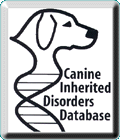
Pancreatitis
Normally, digestive enzymes are produced by the pancreas and secreted into the small intestine where they are essential for the digestion of protein. In pancreatitis these enzymes are activated while still in pancreatic cells, and essentially begin to digest the pancreas itself. This causes the death of pancreatic and surrounding tissue, hemorrhage, acute abdominal pain, and vomiting. The tissue damage becomes self-perpetuating as toxic factors are released into the circulation.
No one specific cause of pancreatitis is known, but several associated factors have been identified. These include high levels of fats in the blood (hyperlipoproteinemia), certain drugs, disruption to the blood supply to the pancreas (during shock for example), some toxins, and certain diseases like diabetes mellitus and hypothyroidism.
Inheritance has not been established, although certain breeds are clearly predisposed to this disorder.
Pancreatitis is generally seen in dogs older than 6 years of age. There is usually depression, loss of appetite, vomiting, and sometimes diarrhea. This may occur off and on over several weeks or it may develop very suddenly and dramatically, with severe abdominal pain, vomiting, shock and collapse. The onset of pancreatitis sometimes follows a high-fat meal, if your dog finds an opportunity to feast on garbage for example.
There are many disorders that cause these clinical signs. Your veterinarian will do x-rays and blood tests that will lead to the diagnosis, and also to look for other contributing causes.
Treatment is aimed at maintaining your dog's fluid and electrolyte balance, to treat or prevent shock while the pancreas is "rested" by withholding food, to allow it to recover. Antibiotics and medication to relieve pain are also given. Any contributing factors that can be identified are treated as well, which may require surgery (for example bile duct obstruction or pancreatic abscess).
With treatment, mild cases of pancreatitis usually recover after a few days. Many of these will be fine over the long term, as long as high fat meals are avoided. Other dogs may develop recurring pancreatitis.
Severely affected dogs will require several days of intense therapy, and there may be complications such as bleeding disorders or acute renal failure. Some of these dogs will die despite good supportive care.
The following are commonly seen: leukocytosis, prerenal azotemia, increased liver enzymes, hyperglycemia, hypercholesterolemia and hypertriglyceridemia (often with grossly evident hyperlipidemia), and elevated amylase and lipase. There are some assays available for pancreatic enzymes and zymogens in serum [check with your diagnostic laboratory], and more being developed which may prove to be of practical diagnostic value.
Although inheritance has not been proved, it is best not to breed dogs from families where pancreatitis is prevalent. This can be difficult because most cases occur in dogs older than 6 or 7 years of age, who may have been used in breeding programmes already.
FOR MORE INFORMATION ABOUT THIS DISORDER, PLEASE SEE YOUR VETERINARIAN.
- Disorder Type:

